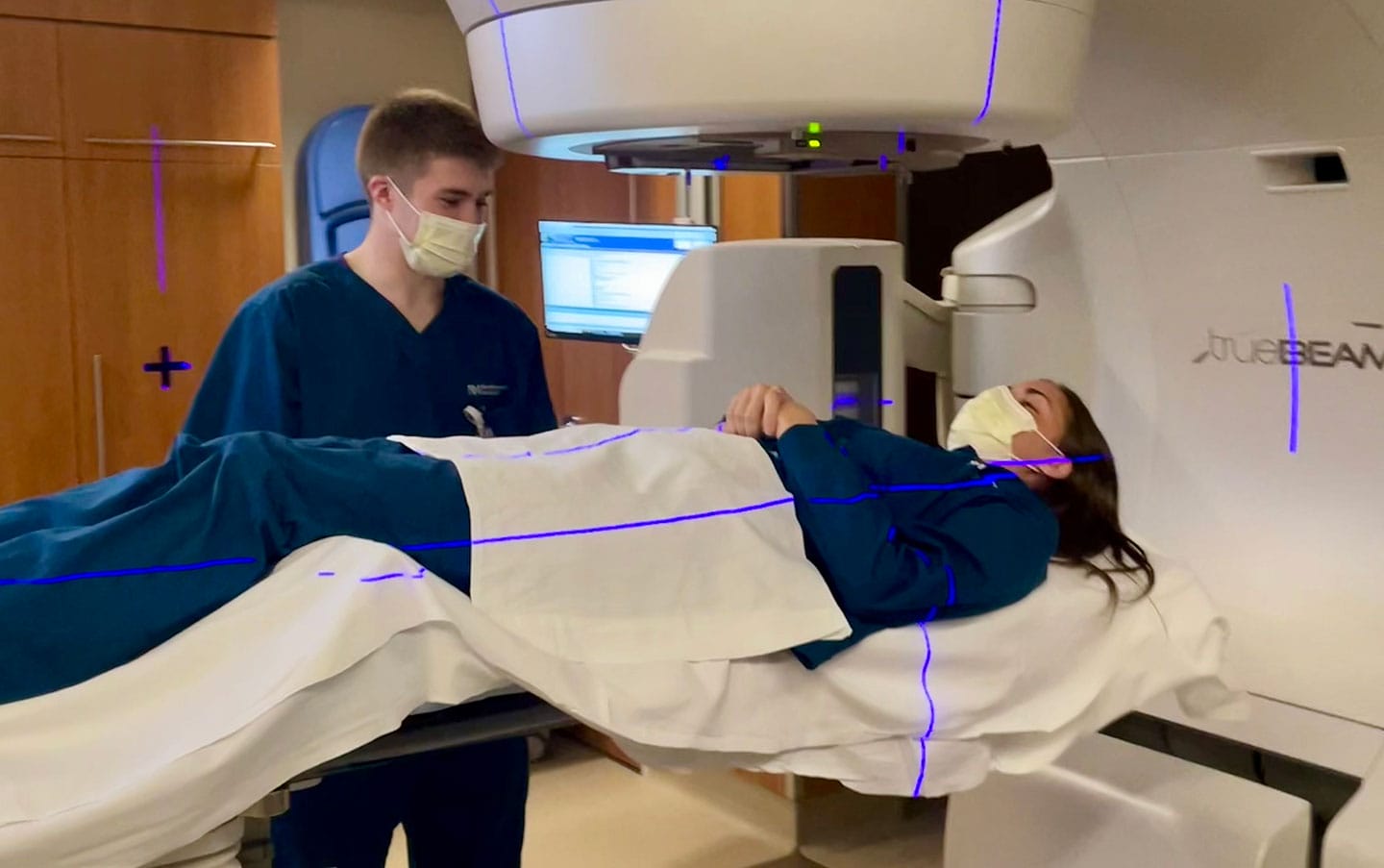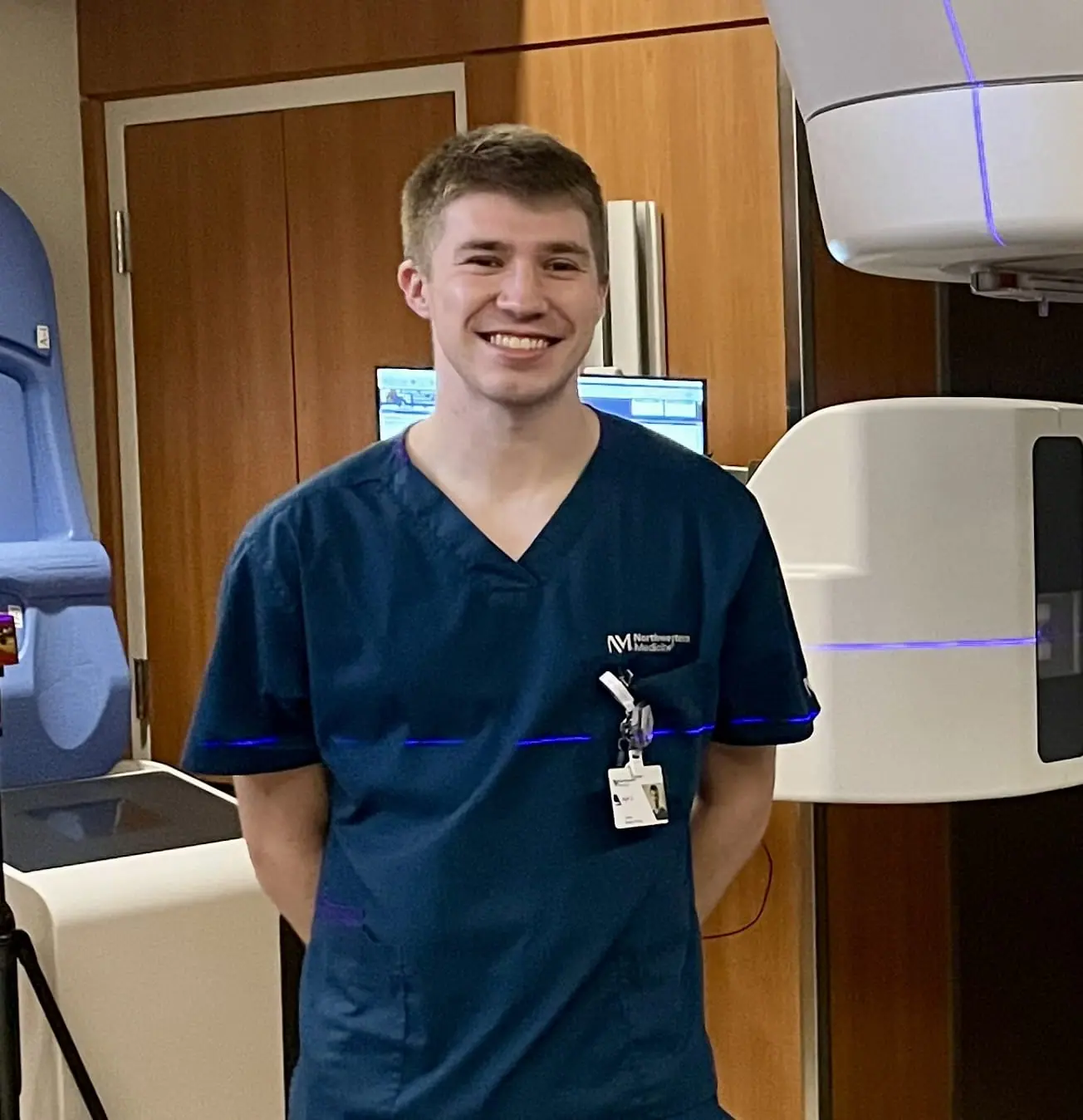Why Study Radiation Therapy at Benedictine University: A Comprehensive and Collaborative Learning Experience
Benedictine University’s Radiation Therapy program offers a unique and comprehensive educational experience that prepares students not only for scientific and technical expertise but also for the human and social aspects of patient care. Our program strikes a balance between a rigorous science curriculum that delves into the principles and applications of radiation therapy, and courses in the humanities and social sciences that foster empathy, communication, and cultural competency.
Students gain hands-on experience working alongside experienced professionals as members of the medical team. This collaborative approach provides opportunities to interact with physicians, nurses, dosimetrists, radiation therapists, social workers, and administrative staff, fostering teamwork, inter-professional communication, and a holistic understanding of patient care.
Through this integrated approach, Benedictine University’s Radiation Therapy program prepares graduates to become well-rounded professionals, capable of providing compassionate and effective care to patients undergoing radiation therapy.
Program Requirements: Radiation Therapy Track
To embark on your journey as a radiation therapist, you’ll need to meet the following program requirements:
- Complete at least 90 semester credit hours with a minimum GPA of 2.800 at Benedictine University. This coursework will provide you with a solid foundation in the scientific principles and clinical applications of radiation therapy.
- Apply to Northwestern Memorial Hospital for the clinical education curriculum in your junior year. The admissions process is competitive, so ensure you demonstrate strong academic performance and a keen interest in the field of radiation therapy.
- Successfully complete the 12-month, 33-semester-credit-hour clinical education curriculum at Northwestern Memorial Hospital in your senior year. This rigorous clinical training will equip you with the hands-on skills and experience necessary to become a proficient radiation therapist.
Eligibility for National Registry Examination
Upon successful completion of the Radiation Therapy program at Benedictine University, you’ll be eligible to sit for the National Registry Examination in Radiation Therapy administered by the American Registry of Radiologic Technologists (ARRT). Passing this exam is a crucial step toward becoming a licensed and certified radiation therapist.
Transfer Student Requirements
If you’re transferring from another institution, you must complete at least 30 semester credit hours at Benedictine University to be considered an affiliate in the application process for the clinical education curriculum. This ensures that you have the necessary knowledge and skills to succeed in the rigorous clinical training program.
A radiation therapy degree opens doors to a wide range of career opportunities in healthcare settings
Radiation Therapist: Radiation therapists are the primary providers of radiation therapy, working with oncologists to deliver precise doses of radiation to targeted areas of patients’ bodies. They provide patient education, monitor treatment progress, and manage any side effects that may arise.
Radiation Therapy Dosimetrist: Dosimetrists calculate the appropriate dose of radiation for each patient’s treatment plan. They work closely with radiation oncologists and therapists to ensure that patients receive the optimal amount of radiation while minimizing damage to surrounding healthy tissues.
Radiation Physicist: Radiation physicists oversee the quality and safety of radiation therapy equipment and procedures. They conduct calibration tests, perform dosimetry calculations, and develop treatment protocols. They also provide training and guidance to radiation therapists and dosimetrists.
Radiologic Technologist: Radiologic technologists operate various imaging equipment, such as X-ray machines and CT scanners, to produce diagnostic images for physicians to evaluate. They may also specialize in radiation therapy technology, working alongside radiation therapists to deliver treatment to patients.
Health Educator: Radiation therapy graduates can also work as health educators, providing information and support to patients undergoing radiation therapy. They may develop educational materials, conduct workshops, and answer patient questions about treatment and side effects.
These are just a few examples of the many career opportunities available with a radiation therapy degree. With your strong foundation in radiation therapy principles, clinical skills, and patient care, you can make a meaningful impact in the lives of others while pursuing a rewarding and fulfilling career in healthcare.
Here is an example of some courses you may take in the Radiation Thearpy program:
- Introduction to Technical Radiation Oncology
- Principles and Practice of Radiation Therapy
- Radiation Physics
- Medical Imaging
- Quality Assurance and Healthcare Operations
Radiation Therapy Courses (RADT)
Lisle undergraduate course descriptions
Mesa undergraduate course descriptions
Requirements – Radiation Therapy Track
Students in the Radiation Therapy program must complete at least 90 semester credit hours with a minimum GPA of 2.800 at Benedictine University. In the junior year, students must apply to Northwestern Memorial Hospital for the clinical education curriculum. The admissions process is competitive. The senior year is a 12-month, 33-semester-credit-hour clinical education curriculum at Northwestern Memorial Hospital, an accredited hospital program affiliated with the University. Upon completion of this program, the student is eligible to sit for the National Registry Examination in Radiation Therapy administered by the American Registry of Radiologic Technologists. Transfer students must complete 30 semester credit hours at Benedictine University to be considered an affiliate in the application process.
Principles of Participation
Most healthcare professional schools do not require that you study a specific academic major. Many students choose Health Science or Biology because there is significant overlap of major courses and prerequisites. However, we recommend that if you have a passion in another area, you can and should major in that area. Graduates who do this find they can incorporate this area of passion into their professional life for a more satisfying career. In addition to your academic (major) advisor, all pre-health profession students should work with a pre-health advisor to guide you in choosing courses that are required for entry into the medical or other healthcare professional school of your choice. Your pre-health advisor will also work with you to ensure that your extracurricular activities are appropriate for successful admission to a healthcare professional program.
The Office of Pre-Health Professions Programs is responsible for supporting students interested in a health profession career. The office is the primary advising center within the University for the health professions and provides career information to students interested in medicine (allopathic and osteopathic), pharmacy, dentistry, optometry, podiatry, chiropractic, veterinary science, physician assistant, occupational therapy, and physical therapy. This office also coordinates health profession practica. Additional programs are available in Medical (Clinical) Laboratory Science, Diagnostic Medical Sonography, Nuclear Medicine Technology, and Radiation Therapy through the Bachelor of Arts in Biology program, and prepare students for progression into Rush University’s MS in Respiratory Care.
Benedictine students and alumni interested in a health professional school after graduation and who meet the criteria are eligible to participate in the HPRC process.
Please read through the information below carefully. Should you have any questions, please contact Karen Mulacek, the HPRC Coordinator.
Visit the HPRC page



